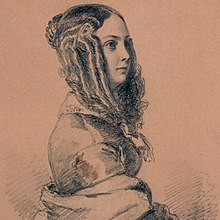Louise Colet
Louise Colet | |
|---|---|
 | |
| Born | Louise Révoil de Servannes 15 August 1810 Aix-en-Provence, France |
| Died | 9 March 1876 (aged 65) Paris |
| Occupation | Poet |
| Language | French |
| Nationality | French |
| Period | 1836–1866 |
| Spouse | Hippolyte-Raymond Colet |
| French and Francophone literature |
|---|
| by category |
| History |
| Movements |
| Writers |
| Countries and regions |
| Portals |
Louise Colet (August 15, 1810 – March 9, 1876), born Louise Revoil, was a poet born in Aix-en-Provence in France.
Life and works
In her twenties she married Hippolyte Colet, an academic musician, partly in order to escape provincial life and live in Paris.
Upon arrival in Paris, Colet began to submit her work for approval and publication and soon won a two-thousand-franc prize from the Académie française, the first of four prizes won from the Académie. At her salon participated many of her contemporaries in the Parisian literary community, such as Victor Hugo.
In 1840 she gave birth to her daughter Henriette, but neither her husband nor her lover, Victor Cousin, would acknowledge paternity. Later she became the paramour of Gustave Flaubert, Alfred de Musset, and Abel Villemain. After her husband died, Colet supported herself and her daughter with her writing.
Her brother was the painter Pierre Révoil. Louise Colet died in Paris.
Though married to Hippolyte Colet, Louise had a steamy eight-year affair, in two stages, with Gustave Flaubert. The relationship turned sour, however, and they broke up. Louise was allegedly so angered by her breakup with Flaubert, she wrote a novel, Lui, in an effort to target Flaubert. However, Colet's book has failed to have the lasting significance of Madame Bovary. Flaubert's dozens of long letters to her, in 1846–1847, then especially between 1851 and 1855, are one of the many joys of his correspondence. Many of them are a precious source of information on the progress of the writing of Madame Bovary. In many others, Flaubert gives lengthy appreciations and critical comments on the poems that Louise Colet sent to him for his judgment before offering them for publication. The most interesting of these comments show the vast differences between her and him on the matter of style and literary expression, she being a gushing Romanticist, he deeply convinced that the writer must abstain from gush and self-indulgence.
Writings of Louise Colet
- Fleurs du midi (1836)
- Penserosa (1839)
- La Jeunesse de Goethe (1839)
- Les Funérailles de Napoléon (1840)
- La Jeunesse de Mirabeau (1841)
- Les Coeurs brisés (1843)
- Lui (1859)
- Enfances Célèbres (1865)
Literature
- Francine du Plessix Gray: Rage and Fire: Life of Louise Colet - Pioneer Feminist, Literary Star, Flaubert's Muse, Simon & Schuster 1994, ISBN 978-0671742386
Texts online (in French )
- L'Institutrice (1840)
- Qui est-elle ? (1842)
- Diane, fragment d'un roman inédit (ca 1850)
- Enfances célèbres (1865)
